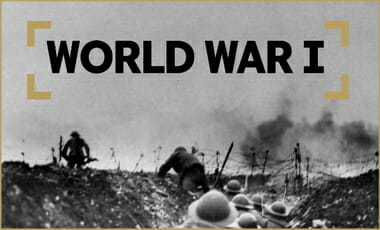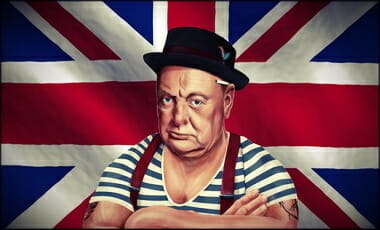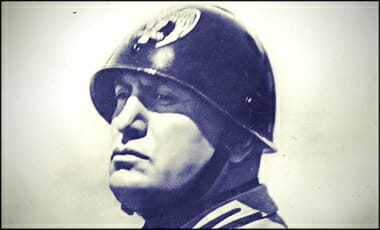…on March 23, 1919, one of the most famous socialists in Italy founded a new party, the Fasci di Combattimento, a term that means “fascist combat squad.” This was the first official fascist party and thus its founding represents the true birth of fascism. By the same token, this man was the first fascist. The term “fascism” can be traced back to 1914, when he founded the Fasci Rivoluzionari d’Azione Internazionalista, a political movement whose members called themselves fascisti or fascists.
In 1914, this founding father of fascism was, together with Vladimir Lenin of Russia, Rosa Luxemburg of Germany, and Antonio Gramsci of Italy, one of the best known Marxists in the world. His fellow Marxists and socialists recognized him as a great leader of socialism. His decision to become a fascist was controversial, yet he received congratulations from Lenin who continued to regard him as a faithful revolutionary socialist. And this is how he saw himself.
That same year, because of his support for Italian involvement in World War I, he would be expelled from the Italian Socialist Party for “heresy,” but this does not mean he ceased to be a socialist. It was common practice for socialist parties to expel dissenting fellow socialists for breaking on some fine point with the party line. This party reject insisted that he had been kicked out for making “a revision of socialism from the revolutionary point of view.” For the rest of his life—right until his lifeless body was displayed in a town square in Milan—he upheld the central tenets of socialism which he saw as best reflected in fascism.
Who, then, was this man? He was the future leader of fascist Italy, the one whom Italians called Il Duce, Benito Mussolini.
Mussolini’s socialist credentials were impeccable. He had been raised in a socialist family and made a public declaration in 1901, at the age of eighteen, of his convictions. By twenty-one, he was an orthodox Marxist familiar not only with the writings of Marx and Engels but also of many of the most influential German, Italian, and French Marxists of the fin de siecle period. Like other orthodox Marxists, Mussolini rejected religious faith and authored anti-Catholic pamphlets repudiating his native Catholicism.
Mussolini embarked on an active career as a writer, editor, and political organizer. Exiled to Switzerland between 1902 and 1904, he collaborated with the Italian Socialist Party weekly issued there and also wrote for Il Proletario, a socialist weekly published in New York. In 1909 Mussolini made another foreign sojourn to Trento—then part of Austria-Hungary—where he worked for the socialist party and edited its newspaper. Returning the next year to his hometown of Forli, he edited the weekly socialist publication La Lotta di Classe (The Class War). He wrote so widely on Marxism, socialist theory, and contemporary politics that his output now fills seven volumes.
Mussolini wasn’t just an intellectual; he organized workers’ strikes on behalf of the socialist movement both inside and outside of Italy and was twice jailed for his activism. In 1912, Mussolini was recognized as a socialist leader at the Socialist Congress at Reggio Emilia and was appointed to the Italian Socialist Party’s board of directors. That same year, at the age of twenty-nine, he became editor of Avanti!, the official publication of the party.
From the point of view of the progressive narrative—a narrative I began to challenge in the previous chapter—Mussolini’s shift from Marxian socialism to fascism must come as a huge surprise. In the progressive paradigm, Marxian socialism is the left end of the spectrum and fascism is the right end of the spectrum. Progressive incredulity becomes even greater when we see that Mussolini wasn’t just any socialist; he was the recognized head of the socialist movement in Italy. Moreover, he didn’t just climb aboard the fascist bandwagon; he created it.
Today we think of fascism’s most famous representative as Adolf Hitler. Yet as I mentioned earlier, Hitler didn’t consider himself a fascist. Rather, he saw himself as a National Socialist. The two ideologies are related in that they are both based on collectivism and centralized state power. They emerge, one might say, from a common point of origin. Yet they are also distinct; fascism, for instance, had no intrinsic connection with anti-Semitism in the way that National Socialism did.
In any event, Hitler was an obscure local organizer in Germany when Mussolini came to power and, following his famous March on Rome, established the world’s first fascist regime in Italy in 1922. Hitler greatly admired Mussolini and aspired to become like him. Mussolini, Hitler said, was “the leading statesman in the world, to whom none may even remotely compare himself.” Hitler modeled his failed Munich Putsch in November 1923 on Mussolini’s successful March on Rome.
When Hitler first came to power he kept a bust of Mussolini in his office and one German observer termed him “Germany’s Mussolini.” Yet later, when the two men first met, Mussolini was not very impressed by Hitler. Mussolini became more respectful after 1939 when Hitler conquered Austria, Poland, Czechoslovakia, Belgium, Norway, and France. Hitler continued to uphold Mussolini as “that unparalleled statesman” and “one of the Caesars” and confessed that without Italian fascism there would not have been a German National Socialism: “The brown shirt would probably not have existed without the black shirt.”
Hitler was, like Mussolini, a man of the Left. Hitler too was a socialist and a labor leader who founded the German Socialist Workers’ Party with a platform very similar to that of Mussolini’s fascist party. Yet Hitler came to power in the 1930s while Mussolini ruled through most of the 1920s. Mussolini was, during those years, much more famous than Hitler. He was recognized as the founding father of fascism. So any account of the origin of fascism must focus not on Hitler but on Mussolini. Mussolini is the original and prototypical fascist.
From Socialism to Fascism
So how—to return to the progressive paradigm—do progressives account for Mussolini’s conversion from socialism to fascism, or more precisely for Mussolini’s simultaneous embrace of both? The problem is further deepened by the fact that Mussolini was not alone. Hundreds of leading socialists, initially in Italy but subsequently in Germany, France, and other countries, also became fascists. In fact, I will go further to say that all the leading figures in the founding of fascism were men of the Left. “The first fascists,” Anthony James Gregor tells us, “were almost all Marxists.”
I will cite a few examples. Jean Allemane, famous for his role in the Dreyfus case, one of the great figures of French socialism, became a fascist later in life. So did the socialist Georges Valois. Marcel Deat, the founder of the Parti Socialiste de France, eventually quit and started a pro-fascist party in 1936. Later, he became a Nazi collaborator during the Vichy regimeVacques Doriot a French communist, moved his Parti Populaire Francais into the fascist camp.
The Belgian socialist theoretician Henri de Man transitioned to becoming a fascist theoretician. In England. Oswald Mosley, a socialist and Labor Party Member of Parliament, eventually broke with the Labor Party because he found it insufficiently radical. He later founded the British Union of Fascists and became the country’s leading Nazi sympathizer. In Germany, the socialist playwright Gerhart Hauptmann embraced Hitler and produced plays during the Third Reich. After the war, he became a communist and staged his productions in Soviet-dominated East Berlin
In Italy, philosopher Giovanni Gentile moved from Marxism to fascism, as did a host of Italian labor organizers: Ottavio Dinale, Tullio Masotti, Carlo Silvestri, and Umberto Pasella. The socialist writer Agostino Lanzillo joined Mussolini’s parliament as a member of the fascist party Nicola Bombacci, one of the founders of the Italian Communist Party, became Mussolini’s top adviser in Salo. Gentile’s disciple Ugo Spirito, who also served Mussolini at Salo, moved from Marxism to fascism and then back to Marxism. Like Hauptmann, Spirito became a communist sympathizer after World War II and called for a new “synthesis” between communism and fascism.
Others who made the same journey from socialism to fascism will be named in this chapter, and one thing that will become very clear is that these are not “conversion” stories. These men didn’t “switch” from socialism to fascism. Rather, they became fascists in the same way that Russian socialists became Leninist Bolsheviks. Like their Russian counterparts, these socialists believed themselves to be growing into fascism, maturing into fascism, because they saw fascism as the most well thought out, practical form of socialism for the new century.
Progressivism simply cannot account for the easy traffic from socialism to fascism. Consequently, progressives typically maintain complete silence about this whole historical relationship which is deeply embarrassing to them. In all the articles comparing Trump to Mussolini I searched in vain for references to Mussolini’s erstwhile Marxism and lifelong attachment to socialism. Either from ignorance or from design, these references are missing.
Progressive biographical accounts that cannot avoid Mussolini’s socialist past nevertheless turn around and accuse Mussolini—as the Socialist Party of Italy did in 1914—of “selling out” to fascism for money and power. Other accounts contend that whatever Mussolini’s original convictions, the very fact that his fascists later battled the Marxists and traditional socialists clearly shows that Mussolini did not remain a socialist or a man of the Left.
But these explanations make no sense. When Mussolini “sold out” he became an outcast. He had neither money nor power. Nor did any of the first fascists embrace fascism for this reason. Rather, they became fascists because they saw fascism as the only way to rescue socialism and make it viable. In other words, their defection was within socialism—they sought to create a new type of socialism that would actually draw a mass following and produce the workers’ revolution that Marx anticipated and hoped for.
Vicious fights among socialist and leftist factions are a recognized feature of the history of socialism. In Russia, for example, there were bloody confrontations between the rival Bolsheviks and Mensheviks. Later the Bolsheviks split into Leninists and Trotskyites, and Trotsky ended up dead on Lenin’s orders. These were all men of the Left. What these bloody rivalries prove is that the worst splits and conflicts sometimes arise among people who are ideologically very similar and differ on relatively small—though not small to them—points of doctrine.
In this chapter I will trace the development of fascism by showing precisely how it grew out of a doctrinal division within the community of Marxian socialists. In short, I will prove that fascism is exclusively a product of the Left. This is not a case of leftists who moved right. On the contrary, the fascists were on the left end of the socialist movement. They saw themselves not as jettisoning Marxism but as saving it from obsolescence. From their perspective, Marxism and socialism were too inert and needed to be adjusted leftward. In other words, they viewed fascism as more revolutionary than traditional socialism.
[….]
Mussolini didn’t believe in race and he wasn’t initially a nationalist; rather, he was a revolutionary syndicalist. The term syndicalism refers to the associations or syndicates to which workers belonged. These were autonomous workers organizations that resembled unions, but they were not unions because the syndicates were organized regionally rather than by corporation or occupation. As dedicated Marxists, the revolutionary syndicalists agreed with Marx that class associations were primary, and that they must be the organizing principle of socialist revolution.
Very much in keeping with this class emphasis that was so central to Marx, the syndicalists, strongly influenced by Sorel, sought to rally the labor syndicates through a general strike that would overthrow the ruling class and establish socialism in Italy. This is what made them “revolutionary.” They intended to foment revolution, not wait for it to happen. They were considered the smartest, most dedicated people in the Italian Socialist Party and they occupied the left wing of the party.
The big names in revolutionary syndicalism were Giuseppe Prezzolini, Angelo 0. Olivetti, Arturo Labriola, Filippo Corridoni, Paolo Orano, Michele Bianchi, and Sergio Panunzio. Most of them were writers or labor organizers. All of them were socialists, and shortly all of them would be camelascists, even though Labriola opposed Mussolini’s regime when it came to power and Corridoni, who was killed in World War I, didn’t live to see it.
Mussolini was their acknowledged leader. He knew them well and conspired with them at meetings and rallies. He read their books and articles and published in their magazines like the Avanguardia Socialista, founded by Laboriola, which was the leading journal of syndicalist thought. Mussolini also reviewed and published the leading syndicalists in his own socialist publications.
Like all revolutionary socialists, the syndicalists had little faith in democratic parliamentary procedures and, consistent with Sorel and Lenin, they sought a charismatic leader who would inspire the workers to action. Mussolini, more than anyone else, fit their prescription. Mussolini was the one who led the syndicalists into a union with the nationalists in order to form the new socialist hybrid called fascism in Italy and (with some modifications) National Socialism in Germany.
The syndicalists organized three general strikes in Italy in 1904, 1911, and 1913. Mussolini supported the strikes. The 1904 strike began in Milan and spread across the country. Five million workers walked off their jobs. The nation was paralyzed: there was no public transportation, and no one could buy anything. Even so, the strike ended without causing either the fall of the government or the installation of socialism.
- Dinesh D’Souza, The Big Lie: Exposing the NAZI Roots of the American Left (Washington, DC: Regnery Publishing, 2017), 65-70, 82-83.



